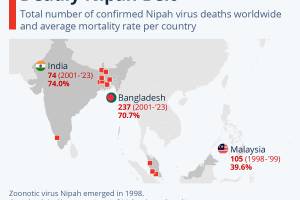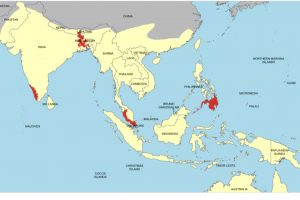Nipah Virus Vaccine
Nipah Virus Vaccines 2025
The World Health Organization (WHO) says Nipah vaccine candidates include live-attenuated and replication-defective recombinant vaccine platforms based on poxviruses, VSV, adenovirus, measles, rabies, and virus-like particles and subunit vaccines. As of April 2025, no vaccine or treatment for the Nipah virus (NiV) has been authorized by the U.S. Food and Drug Administration (FDA) or the European Medicines Agency (EMA), but clinical trials are ongoing.
In June 2023, the Coalition for Epidemic Preparedness Innovations (CEPI) invested up to U.S. $100 million in four Nipah vaccine candidates: Auro Vaccines and PATH, Public Health Vaccines, the University of Tokyo, and the University of Oxford.
Nipah Virus Vaccine Candidates
On March 30, 2025, Gennova Biopharmaceuticals Limited confirmed its work with Houston Methodist Research Institute to develop a self-amplifying mRNA Nipah vaccine candidate.
On May 30, 2024, Auro Vaccines LLC's Nipah Virus vaccine candidate, Hev-Sg-V, published the Phase 1 study results. The induction of antibodies within one month of vaccination and the persistence afforded by two dosages suggest the vaccine candidate has the potential for reactive outbreak control and preventative use.
As of January 11, 2024, the ChAdOx1 NipahB vaccine is being developed by researchers at the University of Pandemic Sciences Institute. Fifty-one people aged 18 to 55 will participate in the first-in-human phase 1 clinical trial, which is being led by the Oxford Vaccine Group within the Department for Paediatrics (Miss Ella Morey, info@ovg.ox.ac.uk) and funded by the CEPI. The study (ISRCTN87634044) will run over the next 18 months, with further trials expected to follow in a Nipah-affected country. NPJ reported in 2022 that ChAdOx1 NiV vaccination protects against lethal Nipah Bangladesh virus infection in African green monkeys. Vaccinated animals showed no signs of disease, and we could not detect infectious viruses in tissues or on all but one swab. No limited antibodies against fusion protein or nucleoprotein antigen could be seen 42 days post-challenge, suggesting that vaccination induced a robust protective immune response, preventing extensive virus replication. In 2019, a study reported that a single-dose ChAdOx1-vectored vaccine protects against Nipah in Bangladesh and Malaysia in Syrian golden hams.
Modern Inc.'s mRNA-1215 Nipah virus vaccine canna Inc. The phase 1 clinical trial was updated in 2023.
Public Health Vaccines LLC sponsors PHV02, a live, attenuated, recombinant vesicular stomatitis virus vector vaccine candidate expressing the Nipah virus (Bangladesh strain) and the Ebola virus glycoprotein. The VSV-NiVG vaccine offers broad protection against NiV disease. It affords protection after a single injection; it protects from homologous and heterologous challenges using the licensed VSV-EBOV vector as a backbone. The phase 1 clinical trial was last updated on March 14, 2023.
The International Centre for Diarrhoeal Disease Research in Bangladesh also studies survivors better to understand the body's response to the virus and support vaccine development. CEPI will provide up to $980,000 to support the research.
PhylexBioSciences's second-generation nanoparticle mRNA vaccine technology directly applies to developing a Nipah virus vaccine. The mRNA vaccine candidate encodes for a nanoparticle displaying 60 copies of the antigen based on the head domain of the G protein of the Nipah virus. On September 22, 2023, Phylex published proof of principle directly applicable to developing a Nipah virus vaccine.
Nipah Outbreaks
Nipah is a zoonotic disease that is spread between animals and people by fruit bats, according to the U.S. National Institutes of Health (NIH). Nipah and henipavirus diseases are considered priority pathogens by the World Health Organization (WHO) because of their potential to cause public health emergencies.





